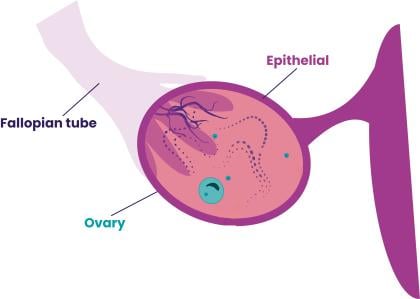Ovarian cancer, often dubbed the “silent killer,” presents a unique challenge in women’s health due to its subtle and easily dismissed symptoms. Unlike conditions with more overt manifestations, ovarian cancer often mimics common, less serious ailments, leading to delayed diagnosis and potentially devastating consequences. Symptoms such as bloating, pelvic discomfort, feeling full quickly, and frequent urination can be readily attributed to everyday occurrences, causing women to overlook the possibility of a serious underlying condition. This tendency to dismiss these symptoms is compounded by the deep-seated location of the ovaries within the abdomen, allowing the cancer to progress undetected until it reaches a more advanced stage. Therefore, raising awareness about the subtle nature of ovarian cancer symptoms and promoting proactive healthcare-seeking behavior are crucial for early detection and improved outcomes.
The insidious nature of ovarian cancer symptoms lies in their resemblance to common, benign conditions. While occasional bloating or pelvic discomfort is normal, the persistence and increasing severity of these symptoms should raise a red flag. Women experiencing frequent or persistent abdominal bloating, a rapid feeling of fullness while eating, increased urinary urgency, lower back or pelvic pain, unexplained fatigue, or sudden changes in their menstrual cycle should seek immediate medical attention. Dismissing these symptoms as minor inconveniences can have dire consequences, as early detection is critical for successful ovarian cancer treatment. Listening to one’s body and recognizing subtle shifts in normal bodily functions are essential for identifying potential warning signs and seeking timely medical evaluation.
Several factors can contribute to an increased risk of developing ovarian cancer. Age, particularly post-menopause, is a significant risk factor, though younger women are not immune. Family history of ovarian or breast cancer, as well as genetic predispositions, can elevate an individual’s risk. Other factors include nulliparity (never having been pregnant), prolonged hormone replacement therapy, certain reproductive procedures, early onset of menstruation, and late menopause. While the presence of these risk factors does not guarantee the development of ovarian cancer, they underscore the importance of heightened vigilance, proactive screening, and prompt medical attention for any unusual symptoms. Understanding one’s risk profile empowers women to make informed decisions about their health and engage in preventative measures.
Cultural and societal factors can further complicate the timely diagnosis of ovarian cancer, particularly in societies like India where women often prioritize their families’ needs over their own health. The ingrained cultural expectation for women to “adjust” and endure discomfort without complaint can lead to delayed seeking of medical care. Modesty, lack of time, and limited access to specialized healthcare, especially in rural areas, contribute to underreporting of symptoms and delayed diagnosis. Furthermore, a lack of awareness and fear of stigmatization can hinder open discussions about women’s health issues. Overcoming these cultural barriers requires community-based education, public awareness campaigns in local languages, and empowering women to prioritize their health and well-being.
Combating the silent threat of ovarian cancer necessitates a multi-pronged approach, starting with widespread awareness and education. Empowering women with knowledge about the subtle symptoms, risk factors, and the importance of early detection is paramount. Encouraging open conversations about women’s health, both within families and communities, can help break down the stigma and silence surrounding this disease. Regular health checkups, including pelvic exams and discussions about family medical history, are crucial for early identification of potential problems. Women should not hesitate to ask questions, seek clarification, and advocate for themselves when it comes to their health. Early and proactive engagement with healthcare providers is essential for timely diagnosis and intervention.
While complete prevention of ovarian cancer may not be possible, early detection significantly improves treatment outcomes. Women at high risk due to family history or genetic predisposition may benefit from specialized screening measures such as regular ultrasounds and blood tests. Adopting a healthy lifestyle, including regular exercise, a balanced diet rich in fruits and vegetables, maintaining a healthy weight, and staying hydrated, can contribute to overall well-being and strengthen the body’s ability to fight disease. Prioritizing one’s health is not selfish but rather a necessary investment in overall well-being. Women should trust their instincts, pay attention to their bodies, and seek medical attention for any persistent or concerning symptoms. Early intervention is key to effectively managing ovarian cancer and improving long-term survival rates.


